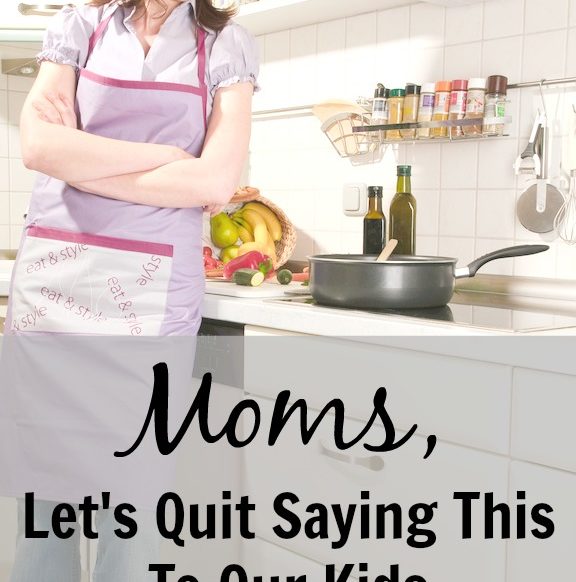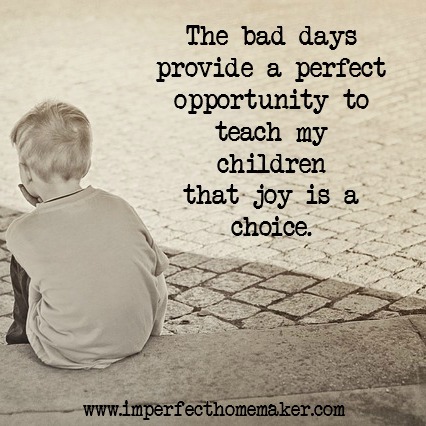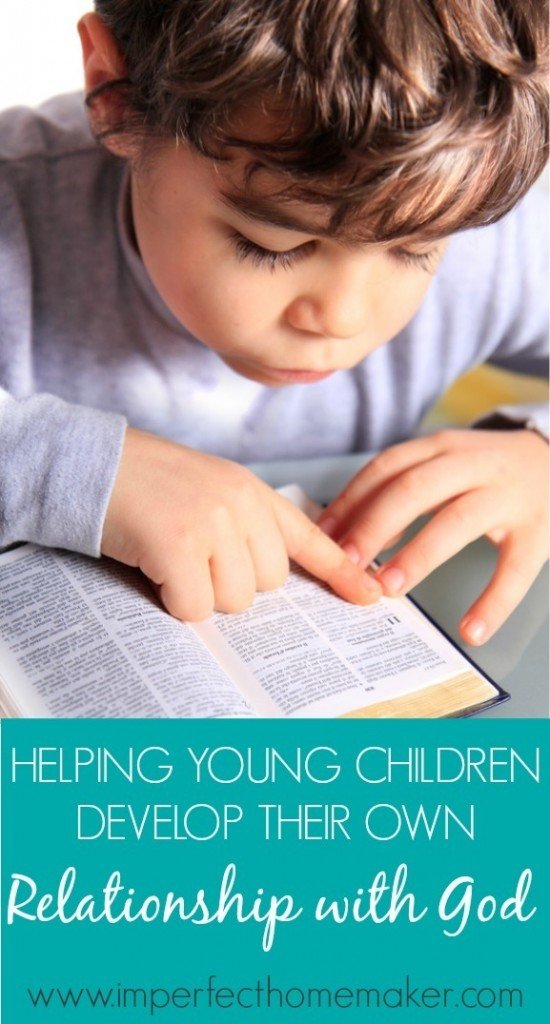Dear Mom, Thank You For All the Stuff You Didn’t Want to Do
Dear Mom,
Today I want to recognize you for all the things you didn't want to do.
It may seem a little strange that I'm not telling you all the wonderful things you did. That doesn't seem very honoring.
But you know what? It's all the things you didn't want to do that make me realize how amazing you are.
When you were tired and ready to fall in your bed, you didn't want to come tuck me in, sing me “just one more song”, or rub my growing-pain riddled legs. But you did it anyway.
When you had a headache, you didn't want to cook supper and get the laundry done. But you did it anyway.
When there wasn't enough supper to go around, you didn't want to give up your own helping, but you did it anyway.
When you had an overwhelming to-do list, you didn't want to take the time to teach me how to “help you”. But you did it anyway.
When you needed a little alone time, you didn't want to spend it reading books to me. But you did it anyway.
When I got sick and left a pukey mess on the carpet, you didn't want to clean it up. But you did it anyway.
When I was being naughty, you didn't want to discipline me for the 15th time for the same thing. But you did it anyway.
Even today, you still do things you don't want to do.
When you have plans for a productive day, you don't want to give it up to watch my kids. But you do it anyway.
When you're tired and just want to go to bed, you don't want to cook supper for my family. But you do it anyway.
When you've just gotten in the groove of a project, you don't want to be interrupted by a long, in-depth phone conversation with me. But you do it anyway.
All these things you didn't want to do don't prove you're a bad mother. They prove you're an amazing mother. What sacrifice is it to read another story, cook another meal, or babysit (again!) if you really don't mind? It's not. But you gave up your own desires for my benefit, and that's sacrifice.
Jesus spent a good deal of time in the Garden of Gethsemane telling God that if there was any other way of salvation than for him to suffer the agony of the cross, he most certainly would take Him up on it. He didn't want to go to the cross. But he did it anyway. That's true love!
And when you as a mother are faced with the things you don't want to do and you do them anyway, that's love.
Real, selfless love.
Thank you, mom, for doing all the things you didn't want to do. Just because you loved me.
10 Ways to Reach the Heart of the Rebel
You know the child.
The one who breaks all the rules. The one who doesn't listen to anything you say. The one who acts carelessly, only thinking of himself and the present moment, with no regard to how his actions will affect others or what long-term consequences his decisions will have.
Some people would call this child the rebel because he goes against everything he has been taught and what he knows is right. He hates being told what to do and bucks against it with all his might.
I have one of those children in my house. This child lives all out.
My mom used to say this little ditty to me when I was a child:
There was a little girl
Who had a little curl
Right in the middle of her forehead.
When she was good, she was very, very good.
But when she was bad, she was horrid.
That pretty much sums up this child of mine.
There are so many wonderful things about this little human, but many days I find myself pulling my hair out wondering why in the world this child will not do what they're supposed to do! Then, to make matters worse, they show no remorse when they've been caught. Discipline seems to have no effect and teaching seems to go in one ear and out the other.
How can I reach the heart of this child?
I wish I could say I had a formula that would magically make my child start thinking outside of their tiny box and look at the bigger picture of God and others. However, all you're going to find here is the musings of a mother who wants more than anything to see her children grow in the Lord, be sensitive to sin, and submit their lives to God's leadership.
Although I'm not an expert (and honestly I don't think anyone can be an expert parent; we're all just imperfect humans trying to figure this thing out, and the answers change for every child), I'm also not approaching this child training thing willy-nilly either. I'm thankful that God has given us direction for training our children in the Bible, that he provides wisdom for specific situations, and that he answers our prayers.
So here is my strategy for reaching the heart of my little rebel:
1. Commit my child's heart to the Lord
First and foremost I must remember that the choices my child makes are just that – personal choices. I cannot make my child do right, and I need to pray every single day for the Holy Spirit to do the work in my child's heart that I cannot do.
2. Love unconditionally
My child needs to know my love – whether I'm pleased with good choices or disappointed with wrong ones – they need to know I don't love them any more or any less based on what they do. The father of the prodigal son watched and waited for his wayward son, proving his forgiveness long before his son asked for it. I need to be careful that I am not holding grudges against my child for misbehavior. Being irritated with my child until they ask forgiveness shows that they are only accepted based on performance.
3. Teach God's Word
The key to my child's victory over sin is found in the Word of God, first through salvation, and second through yielding each day to the Holy Spirit's control. I must be faithful to help my child understand these concepts so they can personally put them into practice in their life.
4. Set boundaries
Although the rebel bucks against boundaries, they also need to know that they cannot live exactly as they please without consequences. Children need clearly set boundaries, with consequences that are consistently carried out when those are crossed. Proverbs 22:6 says, “Train up a child in the way he should go, and when he is old he will not depart from it.” One application of that verse is this: “Train up a child in the way he naturally is bent to go, and when he is old he will not depart from it.” In other words, if you let your child do whatever he wants to do now, you can be pretty sure he's going to do whatever he wants to do when he's grown too. That's not the direction I want my children headed, and therefore I'm not going to allow them to do what they want to do. They're going to have to learn what's expected of them, and they're going to learn from experience that there will be consequences every time they start heading in a different direction. Of course, boundaries and correction must be balanced out with the other things on this list!
5. Give a vision for Point B
If my child is at Point A (living for self and the here-and-now), the goal is to guide them to Point B (living for others, thinking before acting). I need to help my child understand what Point B is and why they want to go there. I'll be having regular meetings with my child to discuss those things.
6. Craft a plan for reaching Point B
It's not enough for my child just to “want to do better.” They need to know exactly what steps to take to reach Point B. It's my job to help create a plan that's personalized to this child that will provide the map for that journey. That map will include not only principles from God's Word and regular prayer with this child, but will also include practical help (for example: “When I feel angry at my brother and want to hit him, I will go in my room and shut the door instead.”)
7. Spend time together
All the teaching and training in the world will hold no weight when it is not backed up by quality time spent with my child. My child needs to know they are valuable, and that while I'm extremely interested in their spiritual growth, I'm also interested in them as a person. When you connect with a child on a personal level, it is much easier to connect on a spiritual level.
8. Encourage progress
Every step in the right direction, no matter how tiny, should be recognized. I don't want discouragement to set in when my child is making efforts to get to Point B but doesn't see any positive results from those efforts. I need to focus on the positive instead of going on and on about every setback. That will be easier when I remember the next point, which is to…
9. Remember God's grace in my own life
Boy, I sure make a lot of mistakes! God probably thinks of me as his little rebel too, based on how often I buck against his control and make my own selfish choices. But he forgives every single time, immediately, and without conditions.
When I think about how patient God is with me it is so much easier to be patient with my child and to remember that there will be mistakes. The goal is not perfection, but progress.
10. Never give up.
Some days will be very encouraging. But some days will be dreadfully discouraging. I can't allow the bad days to derail me from my plan. Just because there are mistakes doesn't mean that the entire strategy is worthless. It just means my child is human and needs some grace to get up and try again.
Do you have a little rebel or did you have one in the past? Has God given you special insight about how to reach their heart? I'd love to hear your thoughts!
Other articles for the Christian mother that you might enjoy:
What I'm Learning About Training Children From an Olive Tree
The Thing Our Children Really Need
To the Weary Mom: Here's Why the Bad Days Are Really The Best Days
Dear Mom of the Prodigal Child
5 Ways to Introduce Your Child To Jesus
As a Christian parent, you desire for your children to know Jesus and to come to their own acceptance of Him as their Savior.
But how do you actually do that?
Here are 5 ways to introduce your child to Jesus:
1. Spend time as a family reading the Bible
Your children need to understand just how important the Bible is. If you never spend time reading it, they will not have any reason to believe it is important. How can they know the truth about Jesus if they do not ever hear it being purposely taught by mom and dad?
If you don't know where to start, try these suggestions for Bible Time with toddlers and preschoolers.
2. Be faithful to church
Do you want your kids to understand how important Jesus is? Show them! Make the effort to get up and go to church every time the doors are open.
If your children constantly see you skipping church because there's a ball game or because you stayed up too late socializing on Saturday night or because some friends invited you to the lake on Sunday, you're sending a loud message to them that Jesus isn't really all that important.
3. Pray with them
Show your children that you have a personal relationship with Jesus by talking to him at regular intervals throughout the day. If you want them to believe that he can be their best friend, they need to see that he is your best friend.
Did you lose your keys? Stop and pray together, asking the Lord to help you find them.
Does your child have a tummy ache? Stop and pray together, asking the Lord to help your child feel better.
Did you find your keys or is your child feeling better? Stop and thank God together for answering prayer.
4. Talk about him throughout the day
Deuteronomy 6:7-9, speaking of the commandments of God, tells us that we should “…teach them diligently unto thy children, and shalt talk of them when thou sittest in thine house, and when thou walkest by the way, and when thou liest down, and when thou risest up. And thou shalt bind them for a sign upon thine hand, and they shall be as frontlets between thine eyes. And thou shalt write them upon the posts of thy house, and on thy gates.”
In other words, talking about the Bible should be integrated into every part of our day. Christian parents should always be looking for opportunities to teach their children the Word of God. When you eat, you can teach them that Jesus is the Bread of Life. When they do wrong, you can teach them what sin is and why they need a Savior. When they have a problem, you can teach them to trust in the Lord. Everything you do and say should be another opportunity to point them to Jesus. (Which means, by the way, that you'll need to spend time studying God's Word as much as you can – you can't teach something you don't know!)
5. Live out his word
It's not just enough to talk about the Bible; you must do what it says. If you truly believe something, it will affect your actions. Your children will decide whether or not the Bible is worth believing based on whether you show that you believe it.
If you want your children to know Jesus, they need to see visible evidence that you know him, that you trust him, and that you obey him.
Need more in-depth help on things like…?
- Insights on making your child’s faith real – and lasting
- Tips for surviving church with little ones (what to bring to church, what to do when they’re loud, how to get them to sit still)
- Jesus-centered books, movies, and toys for kids
- Everyday scenarios to talk about Jesus with your child
- Common personalities in kids, and how to teach each type
- Common questions about teaching a little one about God
I think you would benefit from this little eBook, How to Introduce Your Child to Jesus.
You can purchase it here for $5.99.
Moms, Let’s Quit Saying This To Our Kids
“Mom, can you throw this soccer ball to me so I can practice blocking it?”
“Mom, can you read this book to me?”
“Mom, can we paint something?”
“Mom, can you play a game with me?”
If you're a mom, chances are these are familiar phrases to you.
But I fear too often the answer is an unfortunate “Not right now.”
“Not right now; I'm making supper.”
“Not right now; I'm mopping the floor.”
“Not right now; I'm checking my email.”
I wonder what would happen if our kids heard a lot fewer “Not right now”s and more “Yes! I would love to!”s.
There's definitely a balance between getting the housework done (and yes, your kids can and should help) and spending time just playing.
Sometimes the “not right now” moments are good opportunities for my children to learn character. “We work first and then we play. I'd love to play, but the kitchen needs to be cleaned. We'll clean together and then we'll play together.” But if I'm not careful, I can turn the “work first, play later” philosophy into one big disappointment for my child. There will always be another load of laundry to fold, another dish to wash, another set of crumbs to sweep. If I wait until every shred of work is done the “not right now” moments will never turn into “okay, now” moments.
I'm not even going to try to pretend to have the balance of all that figured out.
But if I can't get it exactly right, I'd ten times rather err on the side of making sure my kids feel important. I don't want them to feel like mom is always putting their needs and wishes on the back burner – like it's something I'll get to if it happens to be convenient.
I'd rather leave the rice getting cold and sticky on the stove while I kick a soccer ball outside than to say “Not right now” and end up never getting around to going outside with my boy. “Sorry, it got too dark. Maybe tomorrow.”
Pretty soon he's going to stop asking because he knows it will only be a weak promise of “In a while” but that later will never come.
But if we eat sticky rice every night while we're out of breath and itchy from playing in the grass, guess what he's going to remember about his mama? He's going to remember that he was more important than her agenda.
Memories are not made from the “Not right now”s.
Memories are made from sticky rice and itchy legs.
I don't know about you, mama, but I don't want my son's childhood to be one long string of “Not right now” moments – moments that could have been a memory but instead became another disappointment for my child.
Together, let's get rid of the endless “Not right now”s. Let's not let our children grow up with large blank gaps in their memory where there should have been loving memories of mama spending time with them while dinner got cold on the stove. They'll never remember what dinner tasted like or whether the last load of laundry was folded.
They'll just know their mama wanted to be with them.
That's what I want my kids to remember. Don't you?
To the Weary Mom: Here’s Why the Bad Days are Really the Best Days
“Ugh. I'm not feeling so well today and there's a ton of housework to be done. I'm so glad we have video homeschool. I'll get the kids occupied with that while I try to whiz through the housework.”
Those were the thoughts that went through my mind as I got up and going for the day.
But, as seems to be the case nine days out of ten, things didn't go exactly as I'd planned.
No. Things didn't go at all how I'd planned.
Just a few minutes after I got the video school going, one of the kids showed up in my room.
“What are you doing? You're supposed to be watching Bible class.”
“It's not working.”
“What do you mean it's not working? I just turned it on a few minutes ago and it was working fine.”
“The screen is black.”
When I went to check to see what was wrong, I found that, sure enough the screen was black. Someone had turned the computer completely off and had decided to plug other items into the computer's outlet. In the process they had tripped the breaker. When I turned the breaker back on, there was no power to the computer. The monitor and printer were working, but the computer wouldn't power up. I called everyone I could think of to help me figure out the problem, but no one could help me.
I was left with a messy house and children who could not do their schooling for the day.
I decided to make the best of it and put the children to work. Ha! That went over like a lead balloon.
No one seemed to be in the mood for housework, and every time I went to prod one child along, another child would create another disaster in a different area of the house. At one point, the baby started crying, and someone carried her to my room and deposited her on my bed (which has a brand new comforter on it). She was covered with peanut butter.
I grabbed her off the bed and started cleaning the peanut butter from her hands and face. Thankfully a baby wipe did a pretty good job of getting it off the comforter too.
I went into the bathroom to check on the child who was supposed to be cleaning it.
Instead of finding the job nearly done, as should have been the case, I found the bathroom floor littered with pieces of toilet paper, soap squirted all over the floor, tub, and sink, and the water running full blast. This wasn't a matter of a child who didn't know how to do the job; this was a matter of a child who decided that experimenting would be more fun than cleaning. And boy, was he hard at work with his experiment!
The events I have recounted are but a small portion of the actual events that took place. There were more. Lots more. And it seemed that the harder I tried to redeem the situation, the worse things got.
One of my children kept saying “This is such a bad day!”
But over and over I kept thinking to myself, “This is not a bad day! This is a good day! These hard days are the best days!”
Now, don't get me wrong. I don't enjoy broken computers or peanut butter stains or dirty bathrooms or whining children any more than you do.
I'd really rather my days go as smoothly as I envision them in my head.
So why do I think the bad days are really the best days?
Bad days provide opportunities to teach my children at a deeper level.
I'm not talking about the opportunity to teach them that we don't unplug the computer (though that definitely wouldn't hurt!) I'm talking about the opportunity to teach them that God knows what's best for us even when we can't understand what's going on. I'm talking about teaching them that joy is a choice and not a feeling.
It's one thing to tell your children these things; it's another thing entirely to live it in front of them. Just a couple nights ago they asked me to tell them the story of Job. So I gave a synopsis of the story along with the application that Job trusted God even when he didn't understand why all those things were happening to him, and we ought to always trust God even when we don't understand what's happening too.
When everybody was complaining about this being such a “bad day”, I was then able to say, “Remember Job? Now we need to practice what we talked about the other night. We need to trust that God knows all about our day and that he knows why these things are happening.” I could remind them of Philippians 4:4, “Rejoice in the Lord always, and again I say rejoice.” God doesn't tell us to rejoice when things are going well; He says to rejoice always. We can only do that by making a conscious choice to do that, and that bad days provide a perfect opportunity for me to help my kids learn how to make that choice.
Bad days sanctify me.
Patience. I sure need a good dose of it on those days that disaster strikes every time I turn around. And God says to “…let patience have her perfect work, that ye may be perfect and entire, wanting nothing.” (James 1:4)
Patience does a perfecting work. I learn to become more gentle, loving, and kind when my natural reaction would be to blow up in frustration. I learn to focus my attention on the eternal instead of being concerned only about the here and now.
Pressure causes all the ugliness in my heart to bubble up to the surface. Instead of using that as an excuse to let my feelings fly, I can use it as an opportunity to recognize the ugliness for what it is – sin, wretched sin, that does not belong in my life. And I can allow the Holy Spirit to scrape that ugly froth right off the top of my cup and to refill my cup with love, joy, peace, longsuffering, gentleness, goodness, faith, meekness, and temperance. (Galatians 5:22-23)
Bad days help me remember to depend on Jesus.
I have this terrible habit of forgetting that I didn't give myself the ability to clean house, or take care of children, or even to breathe.
For some reason the fact that I wouldn't even be alive apart from God seems to slip my mind when everything is smooth sailing. So every once in a while God roughs up the waters a bit to give me a little reminder.
I can't do this mothering thing on my own. I don't have the strength to get such a monumental amount of work done every day. I don't have the wisdom to train children up for the Lord. I can't do anything!
My strength comes from remembering my weakness and fully depending on the unfailing strength of God. “And he said unto me, My grace is sufficient for thee: for my strength is made perfect in weakness. Most gladly therefore will I rather glory in my infirmities, that the power of Christ may rest upon me.” (II Corinthians 12:9)
If it takes a bad day to help me be weak in order that I may be truly strong, I'm willing!
No friends, the bad days aren't fun, but they're good.
Five, ten, or fifty years from now, there will be no lasting value in whether or not I manged to get my house clean on “those days”. But the value in raising children who know how to follow God's Word because they got to see their mama living it out in front of them; the richness of becoming more like my perfect Savior, and the beauty of living in his strength instead of wallowing in my own weakness is absolutely priceless.
I'd say the days that give me priceless gifts are the best days.
You may also like:
The Thing Our Children Really Need
There I stood at the kitchen sink, scrubbing dishes as quickly as I could. Behind me the children were carrying out my instructions: “You, bring me the dishes from the table. You, sweep the floor. You, put this dirty towel in the laundry room…and shut the door!”
I was in no mood for nonsense. We needed to work quickly and I was doing my best to speak in my “I really mean this” voice without actually sounding mean or grouchy.
I don't remember what happened. Someone swung the broom handle around a little too enthusiastically and bumped her, or someone grabbed the dish off the table that she wanted to carry over to the sink, or she got overwhelmed that the job was too hard. It could have been any of them…and honestly this basic scenario has played out many, many times in our household. But whatever it was, it made her upset. Very loudly upset. Yes, a certain 5-year-old in our family tends to act like, well…like she's 5. (Imagine that!)
Taking the time and effort to gently help her think rationally through the situation was not on my agenda at the moment. I really just wanted to tell her to get over it and move on with her life – in more 5-year-old terms, though. Something like, “That's enough. You're fine. Get back to work.”
But before the words could escape my lips, the Holy Spirit of God spoke to me. (Yes, He speaks to me right there at my kitchen sink!) It wasn't in an audible voice, of course, but as swiftly as a whipping blast of wind yet as gently as a whispering breeze, He brought to remembrance a portion of His eternal Word, which is alive, powerful, and applicable to even the smallest aspects of my life.
…But the fruit of the Spirit is love, joy, peace, longsuffering, gentleness…
Gentleness.
Oh, Lord. To be a spirit-filled mama, I must display gentleness to my children.
Even when I need –no, when I want – this kitchen cleaned up in a hurry. My little girl doesn't need me to be unkind and unsympathetic. She needs me to be gentle. Because that's how Jesus wants me to treat her.
I dried my soapy hands and knelt down beside her. I looked deeply into her eyes, gave her shoulders a soft squeeze and said simply. “I'm sorry.” Immediately her crying stopped. She seemed almost incredulous that her no-nonsense mama had just told her she was sorry she got bumped with the broom.
She quickly recovered from her unfortunate incident and was ready to get back to work. I realized then and there that I can be no-nonsense with my children and still be a gentle mama.
I must be a gentle mama.
If I'm not a gentle mama, I am displaying a lack of spirit-control.
Since that day, I've tried to be aware of times when I must make a choice between being gruff and grumpy or being kind and gentle.
And I've found that under the control of the Holy Spirit, I can respond to the 47th call of “I'm dooone!” from the bathroom with a smile and a pleasant demeanor instead of an irritated, “Okay! I'm coming!”
I've found that I can respond to spilled milk with “It's okay. Let's clean it up together!” instead of “Seriously?! Why did you set your cup so close to the edge of the table?”
I've found that I can respond to a child's disobedience with an awareness of my own flawed nature and an understanding of the amazing grace and forgiveness God has given me. And I can show forth an attitude of gentleness instead of exhibiting frustration at the child's failure.
Gentleness doesn't mean I excuse my children's misbehavior, nor does it change the expectations I have for them.
But gentleness shows them God's goodness. It shows them that God loves them for who they are, not for what they do.
How can I help my children be attracted to the God who loves them so much? By allowing them to see his gentleness and kindness reflected in me.
(Romans 2:4) The goodness of God leadeth thee to repentance – not the firm, unrelenting, perfection-expecting hand of God.
(Joel 2:13) …turn unto the LORD your God: for he is gracious and merciful, slow to anger, and of great kindness — not unforgiving and impatient.
There are plenty of times I feel justified in not being so gentle.
You know, like the time I find that a child has not cleaned the toilet seat after they made a mess and then I sit in it. Or that other time when I walk into the bathroom barefoot and step in something wet next to the toilet. Or that other time when someone sits on my lap…and gets my clothes wet. (Yes, I didn't realize before motherhood that I would come in contact with bodily fluids multiple times a day. I thought that would be over once the kids were potty trained, but I think it happens more often now!)
There's just something about those things happening to me that ever so slightly irritates me. (Written with a sickly smile.)
But walking in the Spirit allows me to do things that do not come natural to my flesh.
Instead of huffing and puffing that I just stepped in pee, I have the power to gently remind a child to clean up after himself in the bathroom (or to try to aim a little better in the first place!)
Instead of letting my child know how I feel about the fact that we are running late because he irresponsibly misplaced a shoe, I have the power to extend grace, remember that he's a child, and simply help him look for the shoe.
Do you know what causes me not to be gentle?
Looking out for number one.
Think about it:
- I get snappy because things aren't going according to my plan
- I speak roughly because pee is gross and I don't like it.
- I get irritated because I am being inconvenienced.
Let me fill you in on a little something.
Motherhood is not convenient.
But that doesn't change what the Bible says:
Philippians 2:3-4 Let nothing be done through strife or vainglory; but in lowliness of mind let each esteem other better than themselves. Look not every man on his own things, but every man also on the things of others.
Mothers, I urge you to walk in the spirit and not according to the desires of your own flesh. Through the power of the Spirit, we can be like Christ. We can set aside the thoughts of how we want things to go and turn our focus instead to the needs of others.
And that thing our children need? It's gentleness, mamas.
Gentleness.
Want to learn more? Sign up to receive weekly emails with encouragement for Christian homemakers!





















